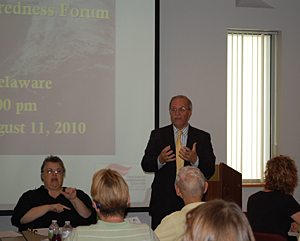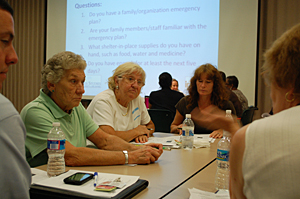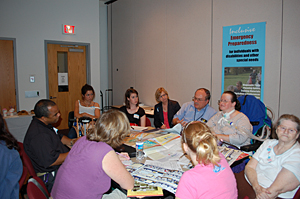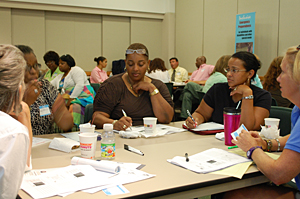


ADVERTISEMENT
- Rozovsky wins prestigious NSF Early Career Award
- UD students meet alumni, experience 'closing bell' at NYSE
- Newark Police seek assistance in identifying suspects in robbery
- Rivlin says bipartisan budget action, stronger budget rules key to reversing debt
- Stink bugs shouldn't pose problem until late summer
- Gao to honor Placido Domingo in Washington performance
- Adopt-A-Highway project keeps Lewes road clean
- WVUD's Radiothon fundraiser runs April 1-10
- W.D. Snodgrass Symposium to honor Pulitzer winner
- New guide helps cancer patients manage symptoms
- UD in the News, March 25, 2011
- For the Record, March 25, 2011
- Public opinion expert discusses world views of U.S. in Global Agenda series
- Congressional delegation, dean laud Center for Community Research and Service program
- Center for Political Communication sets symposium on politics, entertainment
- Students work to raise funds, awareness of domestic violence
- Equestrian team wins regional championship in Western riding
- Markell, Harker stress importance of agriculture to Delaware's economy
- Carol A. Ammon MBA Case Competition winners announced
- Prof presents blood-clotting studies at Gordon Research Conference
- Sexual Assault Awareness Month events, programs announced
- Stay connected with Sea Grant, CEOE e-newsletter
- A message to UD regarding the tragedy in Japan
- More News >>
- March 31-May 14: REP stages Neil Simon's 'The Good Doctor'
- April 2: Newark plans annual 'wine and dine'
- April 5: Expert perspective on U.S. health care
- April 5: Comedian Ace Guillen to visit Scrounge
- April 6, May 4: School of Nursing sponsors research lecture series
- April 6-May 4: Confucius Institute presents Chinese Film Series on Wednesdays
- April 6: IPCC's Pachauri to discuss sustainable development in DENIN Dialogue Series
- April 7: 'WVUDstock' radiothon concert announced
- April 8: English Language Institute presents 'Arts in Translation'
- April 9: Green and Healthy Living Expo planned at The Bob
- April 9: Center for Political Communication to host Onion editor
- April 10: Alumni Easter Egg-stravaganza planned
- April 11: CDS session to focus on visual assistive technologies
- April 12: T.J. Stiles to speak at UDLA annual dinner
- April 15, 16: Annual UD push lawnmower tune-up scheduled
- April 15, 16: Master Players series presents iMusic 4, China Magpie
- April 15, 16: Delaware Symphony, UD chorus to perform Mahler work
- April 18: Former NFL Coach Bill Cowher featured in UD Speaks
- April 21-24: Sesame Street Live brings Elmo and friends to The Bob
- April 30: Save the date for Ag Day 2011 at UD
- April 30: Symposium to consider 'Frontiers at the Chemistry-Biology Interface'
- April 30-May 1: Relay for Life set at Delaware Field House
- May 4: Delaware Membrane Protein Symposium announced
- May 5: Northwestern University's Leon Keer to deliver Kerr lecture
- May 7: Women's volleyball team to host second annual Spring Fling
- Through May 3: SPPA announces speakers for 10th annual lecture series
- Through May 4: Global Agenda sees U.S. through others' eyes; World Bank president to speak
- Through May 4: 'Research on Race, Ethnicity, Culture' topic of series
- Through May 9: Black American Studies announces lecture series
- Through May 11: 'Challenges in Jewish Culture' lecture series announced
- Through May 11: Area Studies research featured in speaker series
- Through June 5: 'Andy Warhol: Behind the Camera' on view in Old College Gallery
- Through July 15: 'Bodyscapes' on view at Mechanical Hall Gallery
- More What's Happening >>
- UD calendar >>
- Middle States evaluation team on campus April 5
- Phipps named HR Liaison of the Quarter
- Senior wins iPad for participating in assessment study
- April 19: Procurement Services schedules information sessions
- UD Bookstore announces spring break hours
- HealthyU Wellness Program encourages employees to 'Step into Spring'
- April 8-29: Faculty roundtable series considers student engagement
- GRE is changing; learn more at April 15 info session
- April 30: UD Evening with Blue Rocks set for employees
- Morris Library to be open 24/7 during final exams
- More Campus FYI >>
8:33 a.m., Sept. 1, 2010----The Center for Disabilities Studies (CDS) at the University of Delaware hosted an Emergency Preparedness Forum for people with disabilities, their families and professionals at four Delaware locations on Aug. 11-12. The purpose of the forum was to provide emergency preparedness information; give participants an opportunity to address individual concerns; and have participants take away information to assist them in developing individualized emergency plans.
The forum presented information that is valuable for everyone during a disaster but its primary focus was on the people who are most vulnerable -- those with special conditions that put them at risk if they are not prepared as well as possible.
Carl Cameron, president of the Inclusive Preparedness Center (IPC), spoke at the first forum, which was held on the Wilmington campus of Delaware Technical and Community College. IPC is a national organization that works to include everyone in emergency planning, response, and recovery -- particularly those more vulnerable to natural and man-made disasters. It is one of several organizations that partnered with CDS to sponsor the forum.
Cameron used Delaware's primary disaster threat, a Nor'easter, to demonstrate how everyone needs to be prepared for a disaster. He reviewed key points in planning for such a disaster, and forum participants broke into small groups three separate times during the forum. They discussed such issues as developing emergency plans, communication and transportation, power loss, and the need to evacuate one's home.
Other speakers at the Wilmington forum included representatives of the city of Wilmington Office of Emergency Management, the Citizen Corps of Delaware, and the Developmental Disabilities Council (DD Council).
The forum held at the Stanton campus of Delaware Tech also included remarks by Delaware Department of Safety and Homeland Security Secretary Lewis D. Schiliro. Forums at other locations featured talks by Delaware Emergency Management Agency Director James Turner and Homeland Security adviser Kurt Reuther.
Schiliro and DD Council Director Pat Maichle announced that Delaware will soon have a voluntary registry to enable emergency planners to better allocate resources for five categories of Delawareans: individuals with disabilities, the aging, the Amish population, non-English speaking residents, and children in care. The establishment of the registry resulted from a study conducted by a work group about the best ways to address the needs of these five groups in an emergency.
Maichle also noted that the DD Council website includes a link to emergency preparedness resources and checklists for people with disabilities.
Because planning is the key to being prepared for a disaster, IPC has published a Disaster Readiness Planning Guide and a Disaster Readiness Planner. The Planning Guide explains how to use the Disaster Readiness Planner to prepare for a disaster. These publications are available in Delaware from the Division of Services for Aging and Adults with Physical Disabilities by calling 800-223-9074 or sending email to [DSAAPDinfo@state.de.us].
The Planning Guide includes the following steps on the “road to readiness”:
- Step 1: Decide what disasters are likely to happen where you live.
- Step 2: Note your personal concerns about how a disaster might affect you and your family.
- Step 3: Find a support network that you can count on during a disaster.
- Step 4: Make certain you have ways to receive information and warnings.
- Step 5: Have several means of staying in touch with others.
- Step 6: Secure the supplies you need to shelter at home.
- Step 7: Get items together in a “Go-Kit” to be ready to leave quickly, if necessary.
- Step 8: Practice using different routes out of town.
- Step 9: Plan in advance where you will go in the event of a disaster.
- Step 10: When you return home, check your home for safety and contact others to let them know where you are.
The Emergency Preparedness Forum was planned by the Center for Disabilities Studies' Emergency Preparedness for Individuals with Disabilities (EPID) initiative.
The goal of EPID is to expand family-centered and inclusive emergency planning and preparedness in Delaware. Planning focuses on family involvement, preparedness of individuals with disabilities, and training for emergency planners and responders.
EPID was started at CDS earlier this year with funding from a one-year grant from the Administration on Developmental Disabilities. This planning grant has a local (Delaware) and regional (tri-state area and beyond) focus and is being carried out in partnership with the Inclusive Preparedness Center in Washington, D.C. For more information, contact Phyllis Guinivan at (302) 831-7464 or [pguiniva@udel.edu].



